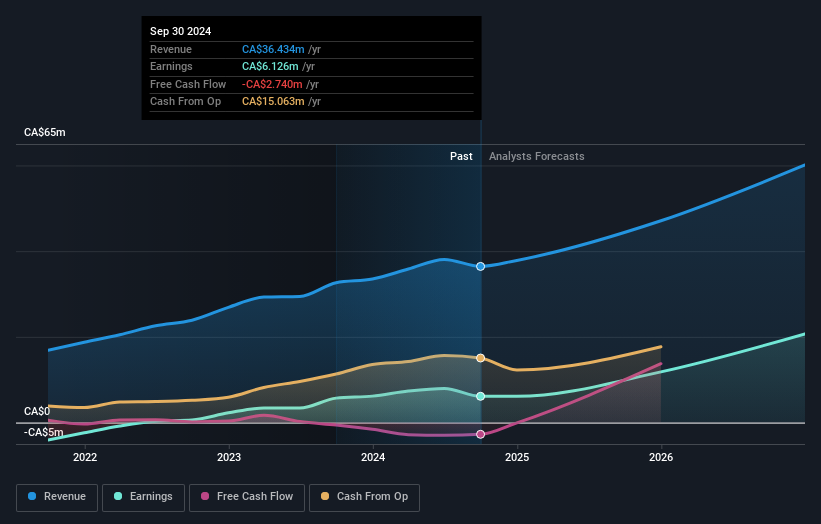- Canada
- /
- Trade Distributors
- /
- TSX:E
Enterprise Group, Inc.'s (TSE:E) 13% gain last week benefited both individual investors who own 48% as well as insiders
Key Insights
- Enterprise Group's significant individual investors ownership suggests that the key decisions are influenced by shareholders from the larger public
- 40% of the business is held by the top 6 shareholders
- Insiders have been selling lately
If you want to know who really controls Enterprise Group, Inc. (TSE:E), then you'll have to look at the makeup of its share registry. We can see that individual investors own the lion's share in the company with 48% ownership. Put another way, the group faces the maximum upside potential (or downside risk).
While individual investors were the group that reaped the most benefits after last week’s 13% price gain, insiders also received a 32% cut.
Let's delve deeper into each type of owner of Enterprise Group, beginning with the chart below.
Check out our latest analysis for Enterprise Group

What Does The Lack Of Institutional Ownership Tell Us About Enterprise Group?
We don't tend to see institutional investors holding stock of companies that are very risky, thinly traded, or very small. Though we do sometimes see large companies without institutions on the register, it's not particularly common.
There are many reasons why a company might not have any institutions on the share registry. It may be hard for institutions to buy large amounts of shares, if liquidity (the amount of shares traded each day) is low. If the company has not needed to raise capital, institutions might lack the opportunity to build a position. On the other hand, it's always possible that professional investors are avoiding a company because they don't think it's the best place for their money. Enterprise Group might not have the sort of past performance institutions are looking for, or perhaps they simply have not studied the business closely.

Hedge funds don't have many shares in Enterprise Group. The company's CEO Leonard Jaroszuk is the largest shareholder with 31% of shares outstanding. For context, the second largest shareholder holds about 3.4% of the shares outstanding, followed by an ownership of 3.3% by the third-largest shareholder. Interestingly, the second-largest shareholder, Desmond O'Kell is also Secretary, again, pointing towards strong insider ownership amongst the company's top shareholders.
A deeper look at our ownership data shows that the top 6 shareholders collectively hold less than half of the register, suggesting a large group of small holders where no single shareholder has a majority.
Researching institutional ownership is a good way to gauge and filter a stock's expected performance. The same can be achieved by studying analyst sentiments. Quite a few analysts cover the stock, so you could look into forecast growth quite easily.
Insider Ownership Of Enterprise Group
The definition of an insider can differ slightly between different countries, but members of the board of directors always count. The company management answer to the board and the latter should represent the interests of shareholders. Notably, sometimes top-level managers are on the board themselves.
I generally consider insider ownership to be a good thing. However, on some occasions it makes it more difficult for other shareholders to hold the board accountable for decisions.
Our information suggests that insiders maintain a significant holding in Enterprise Group, Inc.. Insiders own CA$51m worth of shares in the CA$160m company. This may suggest that the founders still own a lot of shares. You can click here to see if they have been buying or selling.
General Public Ownership
The general public, who are usually individual investors, hold a 48% stake in Enterprise Group. This size of ownership, while considerable, may not be enough to change company policy if the decision is not in sync with other large shareholders.
Next Steps:
It's always worth thinking about the different groups who own shares in a company. But to understand Enterprise Group better, we need to consider many other factors. For example, we've discovered 2 warning signs for Enterprise Group (1 doesn't sit too well with us!) that you should be aware of before investing here.
If you would prefer discover what analysts are predicting in terms of future growth, do not miss this free report on analyst forecasts.
NB: Figures in this article are calculated using data from the last twelve months, which refer to the 12-month period ending on the last date of the month the financial statement is dated. This may not be consistent with full year annual report figures.
Valuation is complex, but we're here to simplify it.
Discover if Enterprise Group might be undervalued or overvalued with our detailed analysis, featuring fair value estimates, potential risks, dividends, insider trades, and its financial condition.
Access Free AnalysisHave feedback on this article? Concerned about the content? Get in touch with us directly. Alternatively, email editorial-team (at) simplywallst.com.
This article by Simply Wall St is general in nature. We provide commentary based on historical data and analyst forecasts only using an unbiased methodology and our articles are not intended to be financial advice. It does not constitute a recommendation to buy or sell any stock, and does not take account of your objectives, or your financial situation. We aim to bring you long-term focused analysis driven by fundamental data. Note that our analysis may not factor in the latest price-sensitive company announcements or qualitative material. Simply Wall St has no position in any stocks mentioned.
About TSX:E
Enterprise Group
Through its subsidiaries, operates as an equipment rental and construction services company in Canada.
High growth potential and good value.
Market Insights
Community Narratives



